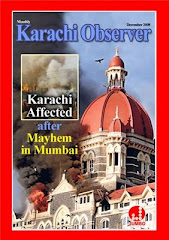
Despite denials from Washington and Pakistan, satellite imagery captures what appear to be three U.S. Predator drones outside a hangar at the Shamsi airbase in Pakistan's southwest.
The U.S. was secretly flying unmanned drones from the Shamsi airbase in Pakistan's southwestern province of Baluchistan as early as 2006, according to an image of the base from Google Earth, the Times of London reported Thursday.
The image -- that is no longer on the site but which was obtained by The News, Pakistan's English language daily newspaper -- shows what appear to be three Predator drones outside a hangar at the end of the runway.
The Times also obtained a copy of the image, whose coordinates confirm that it is the Shamsi airfield, also known as Bandari, about 200 miles southwest of the Pakistani city of Quetta.
The Times reported yesterday that the CIA was secretly using Shamsi to launch the Predator drones that observe and attack Al Qaeda and Taliban militants around Pakistan's border with Afghanistan.
U.S. special forces used the airbase during the invasion of Afghanistan in 2001, but the Pakistani Government said in 2006 that the Americans had left and both sides have since denied repeatedly that Washington was using Pakistani bases.
Two senior U.S. defense officials told FOX News that no Predator unmanned aerial vehicles are currently or have recently been based on Pakistani territory, despite a statement by Sen. Dianne Feinstein, Chairman of the Senate Intelligence Committee, at a recent Congressional intelligence hearing.
However, they could use the Shamsi air base if they needed to. The base is well known to the U.S. military and was used by the Americans in 2001 and 2002 at the beginning of the war in Afghanistan.
One U.S. official told FOX News the U.S. has been flying "Predators or UAVs" in Pakistan since 2002.
There have been 30 strikes since August with 11 top leaders of Al Qaeda taken out, according to intelligence reports.
Senior officials also confirm that Pakistan has been aiding the U.S. in its Predator unmanned aerial vehicle strikes in Pakistan's tribal areas, despite its leaders very public protests that they see the strikes as a breach of sovereignty.
Both President Asif Ali Zardari and General Ashraf Kayani, the head of Pakistan's army, have turned a blind eye to the strikes. According to the officials, these two leaders have launched no protests behind the scenes to U.S. officials about the strikes.
Any public protests have been for public consumption inside Pakistan. One official, however, says that not all elements of the Pakistani government are aware of this cooperation or support it - suggesting other civilian leaders may not be onboard.
The U.S. was secretly flying unmanned drones from the Shamsi airbase in Pakistan's southwestern province of Baluchistan as early as 2006, according to an image of the base from Google Earth, the Times of London reported Thursday.
The image -- that is no longer on the site but which was obtained by The News, Pakistan's English language daily newspaper -- shows what appear to be three Predator drones outside a hangar at the end of the runway.
The Times also obtained a copy of the image, whose coordinates confirm that it is the Shamsi airfield, also known as Bandari, about 200 miles southwest of the Pakistani city of Quetta.
The Times reported yesterday that the CIA was secretly using Shamsi to launch the Predator drones that observe and attack Al Qaeda and Taliban militants around Pakistan's border with Afghanistan.
U.S. special forces used the airbase during the invasion of Afghanistan in 2001, but the Pakistani Government said in 2006 that the Americans had left and both sides have since denied repeatedly that Washington was using Pakistani bases.
Two senior U.S. defense officials told FOX News that no Predator unmanned aerial vehicles are currently or have recently been based on Pakistani territory, despite a statement by Sen. Dianne Feinstein, Chairman of the Senate Intelligence Committee, at a recent Congressional intelligence hearing.
However, they could use the Shamsi air base if they needed to. The base is well known to the U.S. military and was used by the Americans in 2001 and 2002 at the beginning of the war in Afghanistan.
One U.S. official told FOX News the U.S. has been flying "Predators or UAVs" in Pakistan since 2002.
There have been 30 strikes since August with 11 top leaders of Al Qaeda taken out, according to intelligence reports.
Senior officials also confirm that Pakistan has been aiding the U.S. in its Predator unmanned aerial vehicle strikes in Pakistan's tribal areas, despite its leaders very public protests that they see the strikes as a breach of sovereignty.
Both President Asif Ali Zardari and General Ashraf Kayani, the head of Pakistan's army, have turned a blind eye to the strikes. According to the officials, these two leaders have launched no protests behind the scenes to U.S. officials about the strikes.
Any public protests have been for public consumption inside Pakistan. One official, however, says that not all elements of the Pakistani government are aware of this cooperation or support it - suggesting other civilian leaders may not be onboard.
(Fox News Report)























